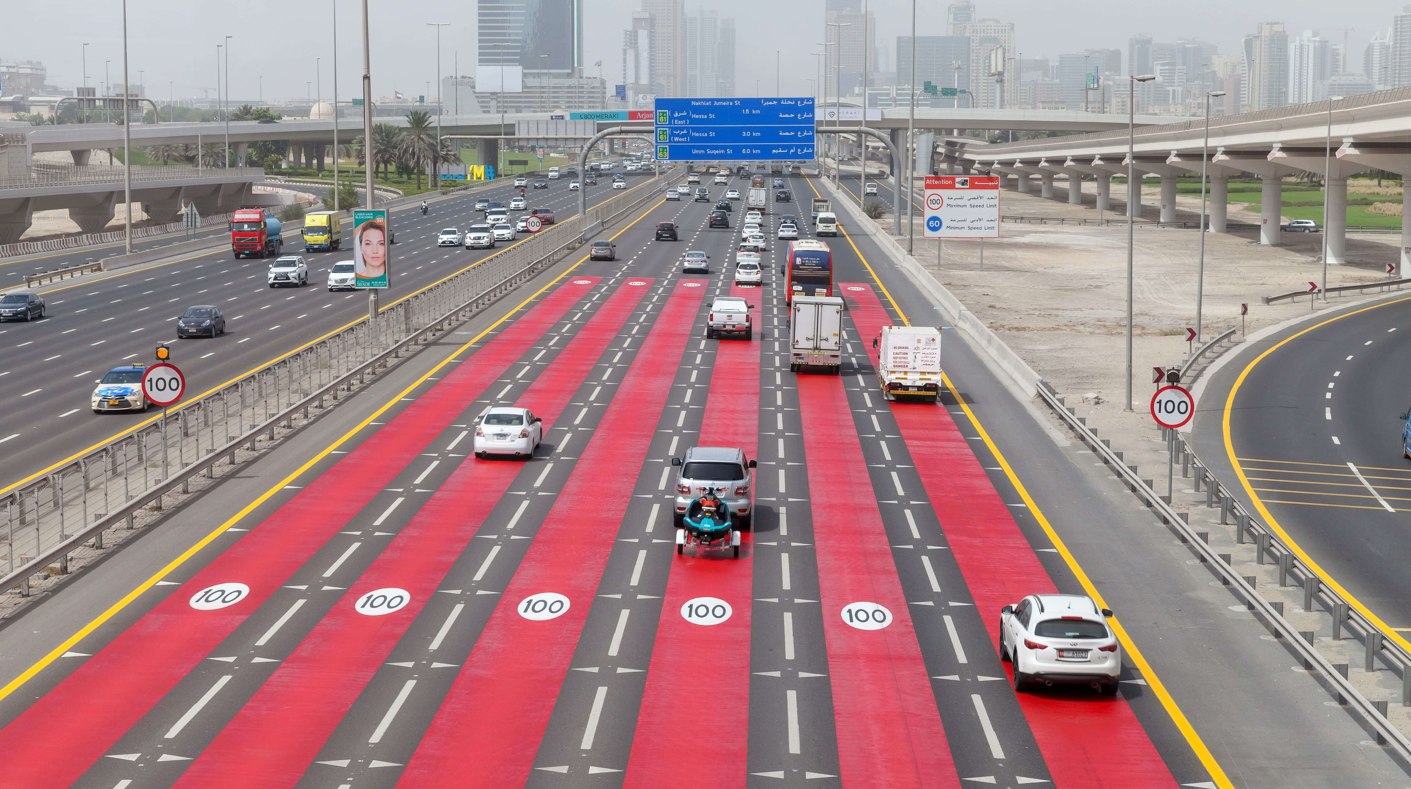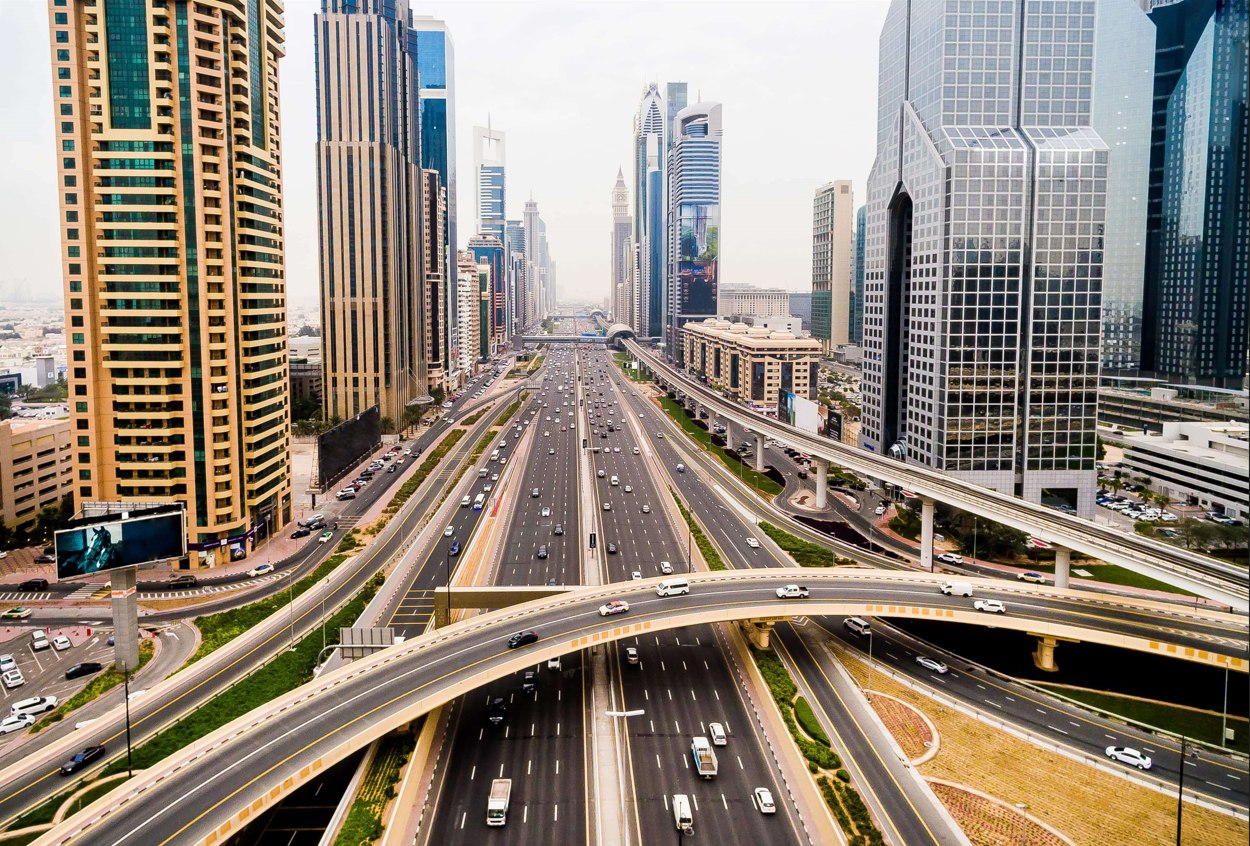Restrictions on Dubai Roads You Need to Know Before Visiting The City
Dubai is a true haven for drivers with its unparalleled set of environments and well-developed infrastructure. Renting a car during a trip is almost a must, but to ensure a comfortable experience, you will need to discover local regulations.
Even though the rules are mostly similar to Europe or the US, there are some differences and small Dubai roads restrictions that you should keep in mind when driving around the Emirate.
List of Most Important Traffic Laws and Regulations in Dubai
The most commonly applied and important Dubai traffic rules and regulations include:
- Speed limits
- Restrictions on dangerous driving and terms for on-road behavior
- Rules regarding vehicle registration and license plate display
- Lane discipline clauses
- Parking rules
- Vehicle maintenance
Unless you’re a resident, you don’t have to worry about half of these regulations, as rental companies are the ones responsible for maintaining cars and registering them. It is obviously not the case with the laws aimed at actual driving, so they should be treated seriously.
Following lane discipline will be rather intuitive, as it only requires you to drive carefully and follow the signs and traffic lights, which are pretty similar to those in Europe or the United States.
Parking, in contrast, might be tricky to comprehend at first due to the large number of different zones and areas, all of which come with their own rules and fees. The topic deserves a separate article, and we’ve already made one about parking in Dubai, so make sure to check it out before your trip.

Road Speed Limits
Knowing the speed limits is key for driving safely and avoiding fines, so let us have an overview of these restrictions on Dubai roads of different types:
- Highways: between 100 km/h and 120 km/h
- Roads in city area: between 60 km/h and 90 km/h
- Suburban roads: 40 km/h
- Parking areas: 25 km/h
The limits might vary in some specific locations, and to know the exact rules for the road you’re on it is better to download a navigational app. But don’t worry if you’re going without Internet connection: there are signs with maximum allowed speeds everywhere.
Not following these Dubai roads restrictions will expectedly result in a fine, where the payable amount depends on by how much the limit was violated. Here is a quick overview of such fines:
- 600 AED for speeding by 30 km/h
- 700 AED for exceeding the limit by 40 km/h
- 1,000 AED for driving up to 50 km/h faster than allowed
- 1,500 AED for exceeding it up to 60 km/h
- 2,000 AED for speeding over 60 km/h
Dubai also has a system of black points, where every violation gets contributed to the total number, and as soon as it reaches a total of 24, the driving licenses get revoked by the government. These points are also applied to foreigners, and even though the RTA cannot suspend a license issued by an authority outside of the UAE, it can still take other actions to prevent reckless drivers from getting behind the wheel in the emirate.
If you are following the Dubai roads restrictions and the driving etiquette, you won’t really have to worry about this system of black points. The number of points issued depends on the Dubai driving rules the person has violated, where exceeding the speed limit by a couple of kilometers per hour will only get you a couple of points, whereas more reckless violations can generate 24 points at once.
Driving Restrictions for Tourists
There are hardly any Dubai driving rules that apply exclusively to tourists and foreign visitors: everyone follows the same regulations. As you could have already guessed, the only exception relates to eligibility.
You won’t have to pass a driving test in order to be able to rent a car in order to reach the best car destinations in Dubai, but you will still have to provide a valid license in order to get the required permission.
It should be mentioned that not every license will do the trick, as the authorities of the UAE only consider documents from a limited list of countries eligible. The good news is that Australia, Canada, Great Britain, the United States, and most European countries all have their driving licenses accepted in the United Arab Emirates. You can always check the full list on the official website of the Road and Transport Authority (RTA).
Car Rental Rules
Even though Dubai traffic rules and regulations are the same for locals and tourists, car rental companies will often have their own additional terms you will need to know.
First of all, they will ask you to demonstrate a driver’s license that is considered valid in the United Arab Emirates. Then, you will normally have to sign a rental agreement with all the terms of service, rates, and other clauses that we strongly recommend reading attentively.
Different rental companies might even have their own minimum age and experience requirements on top of what is stated in the laws. This is why we always suggest selecting the service before your trip to avoid corresponding complications on the spot.
Of course, these businesses are also heavily regulated by the authorities and have their own requirements for vehicle maintenance, reporting their operations, and providing the services. Thankfully, you should not worry about it as a client, as even in case there is a violation in displaying the license plate, for example, the repercussions will be applied to the rental brand.
If you want to learn more about how to rent a car in Dubai, make sure to read our detailed guide on the subject.

Driving Outside The City
Dubai has some of the world’s best assortment of driving environments surrounding it, and it is only natural for the visitors to want to explore them. If you decide to venture out to the neighboring emirates such as Sharjah or Abu Dhabi, you might find the driving style there a bit different, and the roads slightly less loaded, but in general, the conditions are the same.
There are no unique rules that are different from the restrictions on Dubai roads aside from the speed limits we have mentioned in one of the previous sections. You won’t need to obtain a special permission to enter other emirates of the UAE, meaning you can freely travel around the country. It should be mentioned that some car rental companies impose a restriction on where you are allowed to drive in their vehicles, so it is always better to double-check and make sure they support cross-emirate travel.
The situation with visiting nearby countries such as Oman, Saudi Arabia, or Qatar is very different. Since these destinations are located outside of the territory of the United Arab Emirates, you will have to comply with the rules for entrance.
This might include obtaining a visa, following the maximum stay requirement, and other terms that should be acknowledged beforehand. The regulations are different in every of these countries, and they also depend on your nationality, so they should be discovered individually depending on your plans for the trip. Similarly, rental brands often have their own rules preventing their customers from driving outside of the country, so if you’re planning to visit Oman or Saudi Arabia, you should make sure the company allows it.
On Road Etiquette Dubai
Dubai roads restrictions and regulations do not cover every single aspect of driving, leaving the rest to the etiquette of car lovers. These unwritten rules are not very different from the other parts of the world, as they essentially only involve respecting other people on the road and making sure your behavior is safe for other drivers.
You should not go for dangerous overtakes, indulge in tailgating, or speak on the phone when driving. Some restrictions on Dubai roads are written in laws but hardly ever enforced, which also makes them part of the road etiquette: you should still follow them even if you won’t likely be punished for not doing so.
The regulations in the UAE are pretty strict, so the environment on the road is fairly safe and calm. As a foreign visitor, it is your job to maintain this peace and respect the rules that are in place here.

FAQ
Can women drive in Dubai?
Yes, women can drive in Dubai without any restrictions. This includes both local female drivers and tourists, guaranteeing the ladies a full ability to travel around the emirate freely.
What documents do I need?
In order to rent a car, you will only need an ID and a valid driver’s license. Purchasing and registering a vehicle requires obtaining a separate package of documents that should be reviewed individually.
Are there restrictions for tourists?
There are no Dubai roads restrictions that are unique for tourists except for their driver’s licenses having to be issued by eligible countries. The list includes the UK, the US, and most European countries.

















